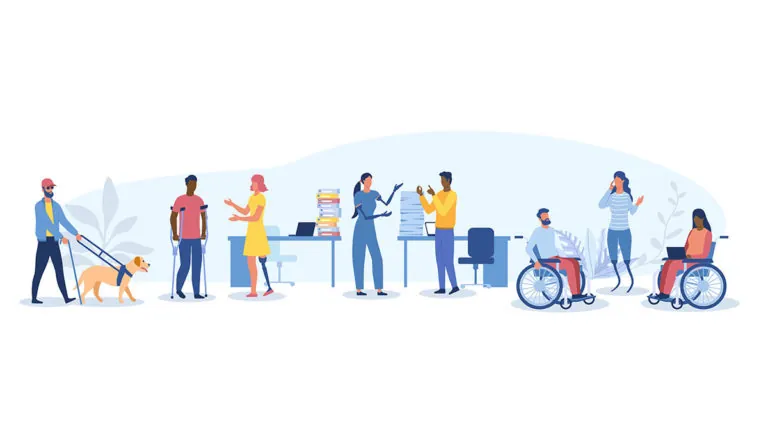“You’re obviously in the wrong place": Ableism, Racism, and Work
People with disabilities or chronic illness experience reduced employment opportunities, leading to financial insecurity and chronic stress, and ultimately, poor health outcomes. Such discrimination echoes similarities with racism.

Read Time: 4 minutes
Published:
Black artist and designer Virgil Abloh passed away in November 2021 from cardiac angiosarcoma. His death was a shock to many. The designer chose to remain silent about his cancer after his 2019 diagnosis. Abloh will be remembered for his ingenuity in the fashion world. In remembering his legacy, Abloh’s decision to not disclose his health condition raises questions about ableism, race, and work.
Racism and ableism share roots in our country’s history of oppressing minority populations. Their intersection unveils a new layer of considerations when we talk about disability. Ableism is the discrimination or devaluing of people with cognitive or physical disabilities, which can include people with chronic illnesses. Those oppressed by ableism are excluded from a world that caters to fully-abled bodies. In 2020, the CDC reported that more than 60 million adults in the United States had some sort of physical disability. The Americans with Disabilities Act (ADA) prohibits discrimination on the basis of disability in employment, including hiring and firing. However, stigma and informal discrimination still threaten the health of this community. One study led by Deborah Carr found that people with functional limitations are at heightened risk of being fired or denied a promotion. Another study found that workers with disabilities feel that their intelligence and skills are underestimated, and that they are treated like “second-class citizens”. People with disabilities or chronic illness experience reduced employment opportunities, leading to financial insecurity and chronic stress, and ultimately, poor health outcomes. Such discrimination echoes similarities with racism.
When a person of color experiences a disability, this person faces two systems of oppression, racism and ableism, that heighten their likelihood of experiencing other health concerns.
When a person of color experiences a disability, this person faces two systems of oppression, racism and ableism, that heighten their likelihood of experiencing other health concerns. Black people with impairments face significantly lower income, lower participation in the labor force, and higher poverty levels. The U.S is scarred with a history of policing of Black disabled people. Over 50% of disabled Black Americans have been arrested before the age of 28. In 2017, it was estimated that 1 in 4 Black people were living with a functional limitation. It was unsurprising that Virgil Abloh was not the only Black celebrity to hide an illness.
Chadwick Boseman, known for his portrayal of T’Challa in Black Panther, died of colon cancer in 2020. Like Abloh, Boseman kept his illness hidden off camera. In his unforgettable final performance as Levee in Ma Rainey’s Black Bottom, his character compares life and death: “Now death… death got some style. Death will kick your ass and make you wish you never been born . . . But you can rule over life. Life ain’t nothing.” An article by The Insider on the two artists’ deaths concluded with how “successful people of color are sometimes forced to choose between their health and their work legacy.” Essentially, due to racial discrimination and biases, people of color may hide their impairments to “rule over life,” continue to work, and preserve their history of productivity and excellence. We cannot say for sure that Virgil Abloh and Chadwick Boseman chose to conceal their illnesses because of race or disability so they could pursue their work, but these concerns likely contributed to their worries.
Workplace changes can make for more inclusive environments and higher rates of employment for people with disabilities. Companies with inclusion practices, such as budgeting accommodations for employees and having disability management (helping employees return to work), were more likely to have higher rates of employees living with a limitation. Police forces can undergo disability training to reduce harm to those with disabilities.
I went to see Virgil Abloh’s art exhibit “Figures of Speech” last summer at the Institute of Contemporary Art in Boston. One display posed white mannequins bathing in hovering neon lights reading “You’re obviously in the wrong place.” At the time, I thought this piece represented the rejection Black Americans feel in a society that continues to displace them. Knowing the circumstances of Abloh’s death, I now view the exhibit with ableism and racism in mind, how perhaps he felt that he was in the “wrong place” to share his illness. Such stigma can cause even an artist to refrain from expression.
Illustration via Getty Images



